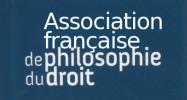Paper's abstract
Albert
Rigaudière,
Political practice and public law in 14 and 15th centuries' France
The contribution, however essential, of the learned doctrine of the 12 and 13th centuries could not, by itself, allow the bringing out of the notion of a public law bound to become slowly autonomous. The ideas and concepts of a rediscovered Roman law, closely examined by specialists in Roman law, adjusted by doctors in canonical law and revisited by the scholastic constituted only scattered elements. Separated from the system that had seen their birth, they could only find again their unity at the very moment when they would again be integrated to an operating and functional whole. This was the role allotted, as soon as the 12th century ended, to the sovereign, his administrators and his judges. All actors of a new political practice, they slowly tear the nascent State from the sphere of private law in order to submit, during all the 14 and 15th centuries, corona, dignitas and constitutio to a statute of public law, while its administration progressively becomes a matter for a system inordinate from common law, be it its universitates, its agents or its assets.
Key Words : political public, France, History
t. 41, 1997 : p. 83-113
